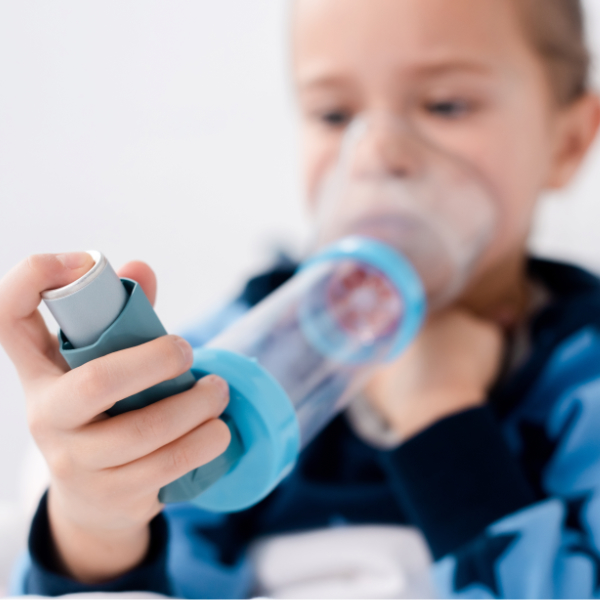Why Some Children Develop Asthma

Asthma develops due to a combination of genetic, environmental, and nutritional factors, often starting early in life.
Your child may be more likely to develop asthma if they:
- Have a family history of asthma, eczema, or allergies
- Were exposed to tobacco smoke, air pollution, or damp housing early in life
- Have other allergic conditions, such as eczema, hay fever, or food allergies
- Had frequent chest infections or wheezing episodes in infancy
Some children are more sensitive to allergens or irritants in the environment, which can increase inflammation in their airways and trigger asthma symptoms.
Common Triggers
Asthma symptoms may be triggered by:
- Viral infections (e.g. colds)
- Allergens (e.g. pollen, dust mites, pets)
- Exercise, especially in cold air
- Air pollution and smoke
Explore Common Asthma Triggers
When to suspect asthma in your child
You should consider asking your GP for a referral if your child:
- Has frequent coughing or wheezing
- Gets breathless during play or exercise
- Wakes up at night coughing
- Has needed oral steroids or visited A&E for breathing issues
- Uses their reliever inhaler more than twice a week
Getting a Diagnosis
For children over 5, diagnosis usually involves:
- Lung function testing to check lung function
- FeNO testing (a simple breath test for airway inflammation)
- Allergy Skin Prick test
- A trial of asthma medication to see if symptoms improve
For children under 5, tests are harder to perform. Instead, doctors may recommend a trial of treatment and monitor the response.
Referral to a Specialist
Your GP may refer your child to a paediatric respiratory specialist if:
- The diagnosis is uncertain
- Symptoms are severe or not responding to standard treatment
- They’ve had multiple A&E visits or hospital admissions
- They have signs of other underlying conditions
At the London Asthma Clinic, we provide expert diagnosis and personalised care plans tailored to your child’s needs.
Managing Asthma
Effective asthma care includes:
- Daily preventer inhalers (usually a low-dose steroid)
- Reliever inhalers for symptoms
- Identifying and avoiding triggers
- Education for the child and family
- A written asthma action plan
Newer Treatments: Biologics
For children with severe asthma not controlled by standard treatments, newer injectable medications called biologics may help. These include:
- Omalizumab (targets allergic asthma)
- Mepolizumab (targets eosinophilic inflammation)
- Dupilumab (used in allergic and eosinophilic asthma)
Helping Families Understand and Take Control
We support children and families with:
- Personalised asthma education
- Home environment advice (e.g. smoke, mould, pets)
- Written asthma action plans
- Monitoring and follow-up care
Our goal is to reduce flare-ups, hospital visits, and school absences — helping your child lead a healthy, active life.
Contact Us or Arrange a Referral
If you’re a parent concerned about your child’s breathing, or a GP looking to refer a patient, don’t hesitate to get in touch with us to discuss next steps or arrange a consultation with Professor Gupta.
